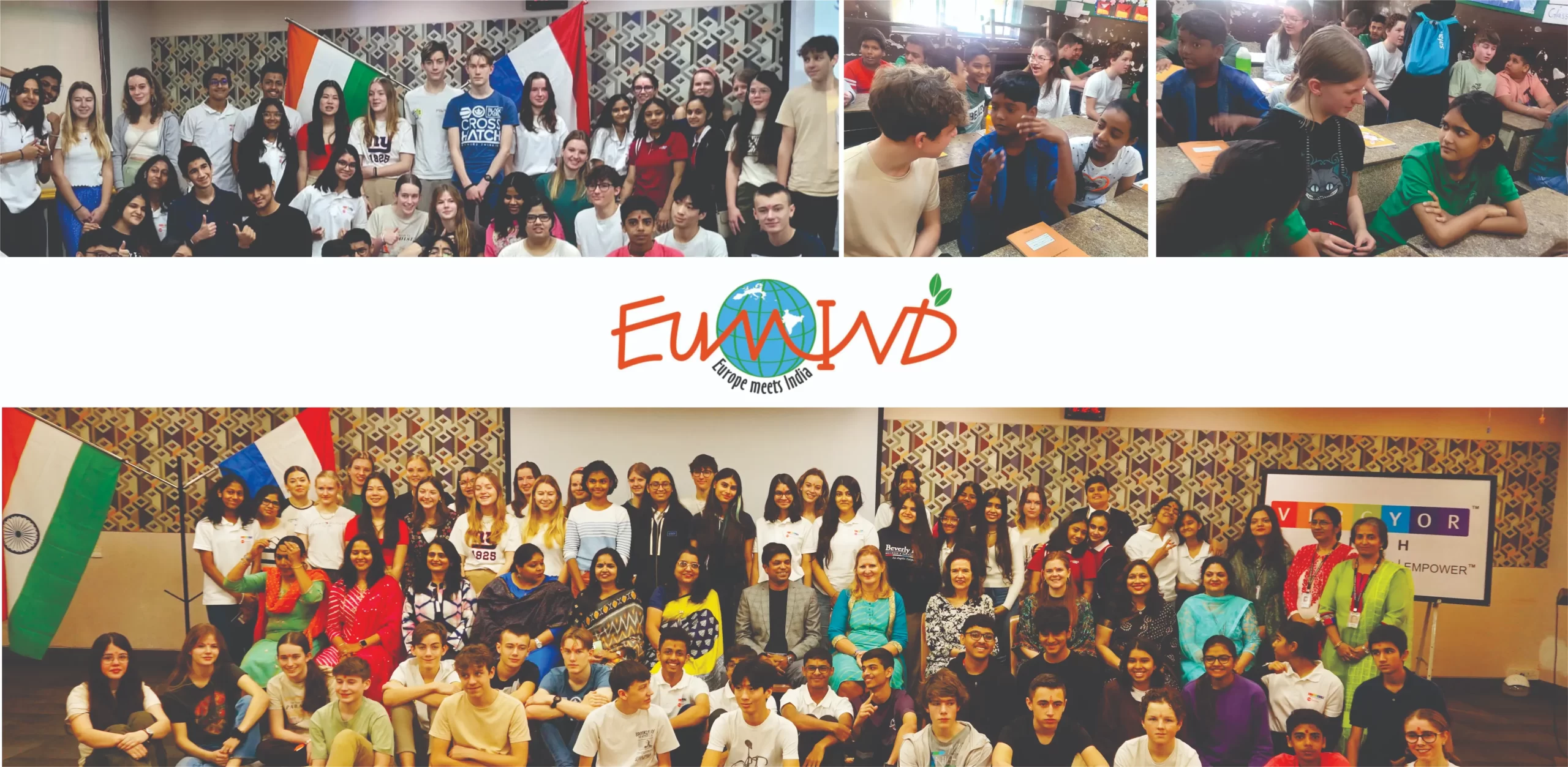![]()
The future is global, and the rise of international schools in India signals the rising demand for an international approach to education. This shift isn’t just a trend; it is a recognition that students need a global perspective to navigate future opportunities and challenges.
The 2024 Demand for International Schools in India Continues to Grow report by ISC Research mentions that enrolment has surged, with over 4,16,000 students aged 3 to 18 now thriving in internationally-focused K-12 schools.
A new era in learning: The global impact on Indian schools
So, what does this mean for Indian education? The growing presence of international schools has several key implications:
Global competencies and skills
Imagine students collaborating on a virtual project with their peers in China, learning about sustainable development from different cultural perspectives. By integrating global perspectives in classroom learning, international schools equip students with critical thinking, collaboration, and adaptability – skills vital for thriving in today’s dynamic landscape.
Shift towards holistic education
Besides academics, 21st-century skills through global education can be gained by participating in real-world projects, fostering holistic development and future readiness. For instance, Model United Nations (UN) conferences encourage students to engage in global diplomacy, improve public speaking, and develop critical decision-making skills while learning about real-world issues like human rights and more. Introducing startup incubation projects helps students pitch ideas to investors, and learn financial management, preparing them for real-world economic challenges. Community development initiatives like waste management campaigns, and clean energy innovations teach them about environmental responsibility and problem-solving for a better future.
Language and multilingualism
With a focus on bilingual and multilingual education, students can thrive in a globally connected world. According to the 2012 Neurocognitive, Social, and Personal Benefits of Bi/Multilingualism report by The Japan Association for Language Teaching (JALT), multilingualism offers advantages to individuals throughout all stages of their lifespan, from infancy and adolescence to late adulthood. For instance, a student fluent in Spanish or Mandarin alongside English can break cultural barriers and enhance career opportunities. Beyond career advantages, it enhances cognitive flexibility, memory, problem-solving skills and empathy, equipping students to engage meaningfully in diverse environments.
Raising the bar on quality education
Author George Couros mentioned, “Technology will never replace great teachers, but in the hands of great teachers, it is transformational.” With STEAM learning, AI-driven classrooms, and interactive pedagogy, global education transcends borders, enabling students to collaborate across cultures, gain diverse perspectives, and solve global challenges. These innovations prepare students to thrive in an interconnected world, fostering adaptability, creativity, and cross-cultural understanding essential for the 21st century.
Preparing for higher education
The importance of a global curriculum is evident in boards like CBSE, IB, and Cambridge programmes, which equip students with research skills and independent learning. Graduates from Indian international schools gain admission to top-tier institutions worldwide, excelling due to their strong analytical, leadership, and creative abilities.
Transforming Indian education, strengthening India’s NEP goals
The National Education Policy (NEP) envisions a globally competitive education system that is deeply rooted in Indian ethos. The 2024 report The Future of International Schools in India by IME Research states that the market for international curriculum schools in India is expected to reach $14.67 billion by 2030. The surge in international schools in India is a testament to this transformative shift, equipping students with world-class competencies, flexible learning pathways, and holistic development.
For instance, NEP 2020 emphasises the internationalisation of education, aiming to make the Indian education system self-reliant and aligned with global standards. This approach is expected to attract more international students and facilitate research collaborations with foreign institutions.
This synergy between NEP objectives and international schools prepares students to thrive in a globalised world while preserving their cultural identity.
Global education revolution: How schools can make a difference
Preparing students for a globalised world, schools can instil 21st-century skills through global education by adopting international curricula in boards such as IB, CBSE, and Cambridge. Through various student exchange programs, schools can encourage cross-cultural learning and awareness of global issues such as climate change, human rights, social justice, etc. Collaborations with organisations like UNICEF or the British Council deepen student engagement, transforming classrooms into hubs of cultural exchange and proactive global leadership, inspiring students to shape a better, interdependent future.
Benefits of global perspectives in school education
By embracing global perspectives, students possess a broader outlook, develop a sense of responsibility to the world, and inspire change and innovation.
- Encourage lifelong learning and adaptability: Adopting global perspectives in school education boosts curiosity and lifelong growth. By embracing diverse ideas, students learn to adapt to change, turning challenges into opportunities. This mindset empowers them to navigate the future with resilience, a crucial skill for success in today’s dynamic world.
- Foster cultural sensitivity: As Maya Angelou said, “We all should know that diversity makes for a rich tapestry, and we must understand that all the threads of the tapestry are equal in value.” Global perspectives explore the beauty of diverse cultures. As students explore histories and traditions, they learn to celebrate differences, creating a world united by respect and shared wisdom.
- Improve critical thinking and problem-solving skills: A global lens sharpens young minds, and develops skills such as critical thinking and innovative problem-solving. By encountering diverse viewpoints and navigating complex global issues, students become insightful thinkers and effective change-makers.
- Prepares for a globalised workforce: In today’s evolving society, global perspectives in school education are no longer an advantage; they are a necessity. Exposure to global issues prepares students to strengthen adaptability, cross-cultural communication, and the skills needed to excel in the international marketplace.
- Promote social responsibility and global citizenship: Understanding global interconnectedness cultivates empathy and a sense of responsibility among students. They learn to appreciate diverse cultures, recognise global challenges, and develop a sense of global citizenship, inspiring them to make a positive impact.
VIBGYOR’s Global Immersion Programme: Bridging cultures, building futures
Education isn’t just confined to textbooks; it thrives in the stories, cultures, and experiences that shape the world. True learning happens when students step beyond the familiar, embracing the unknown by integrating global perspectives in classroom learning. Student exchange programmes are transformative experiences that empower young minds, fostering empathy and understanding across cultures. At VIBGYOR High, our Immersion Programmes are designed to do just that – bridging classrooms with real-world experiences, fostering empathy, and nurturing a global mindset.
Our Grade 10 to 12 students embarked on a Domestic Immersion Programme, a four-night, five-day journey through India’s academic powerhouses, such as IT Delhi, Jindal University, Ashoka University, and Shiv Nadar University. They gained invaluable insights into higher education and the vibrant pulse of the nation’s capital.
https://www.vgos.org/v-embarkMeanwhile, as part of the EUmIND (Europe Meets India) Programme, 30 students, along with their teachers and principal, explored the Netherlands, immersing themselves in Dutch culture, cuisine, and local traditions while building meaningful international connections. Their global pursuit continued in the USA, where our students visited nine prestigious universities, including Ivy League institutions, engaging with professors, exploring historic landmarks, and experiencing American culture firsthand.
Adding to this transformative journey, students from VIBGYOR High, Marathahalli, ventured to Germany for a 10-day Global Immersion Programme. Exploring historic sites and engaging in thought-provoking discussions with German students, they experienced the power of cross-cultural exchange.
These visits not only highlight the importance of global exposure in student development but also showcase how such experiences shape students into more adaptable, compassionate, and globally aware citizens.
As we embrace global perspectives in school education, we empower students to break boundaries, think critically, and approach the world with an open, adaptive mindset. By nurturing empathy, cultural sensitivity, and collaboration – education becomes a force that shapes responsible global citizens. With international programs and curricula, students are not just prepared for higher education but for a world of endless possibilities. Together, the focus is on building a world where learning knows no bounds and every student can make a difference.

